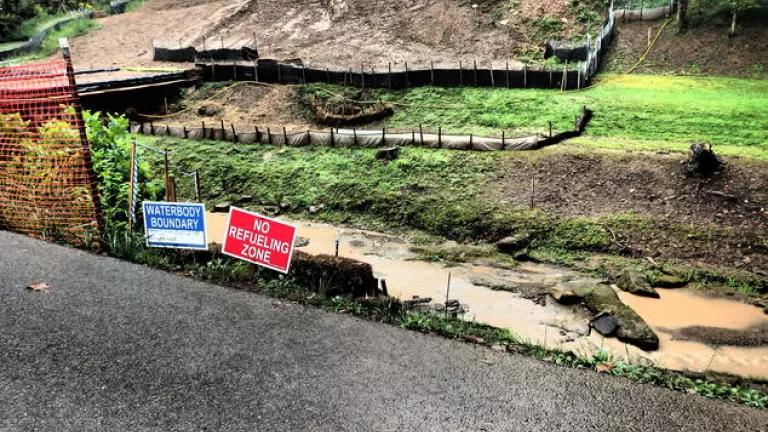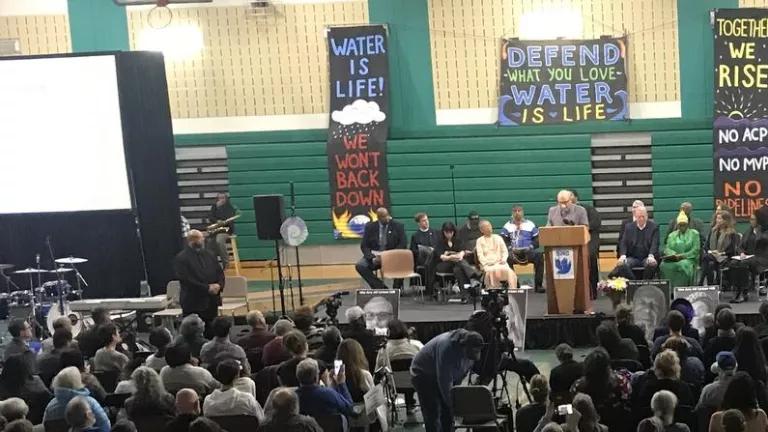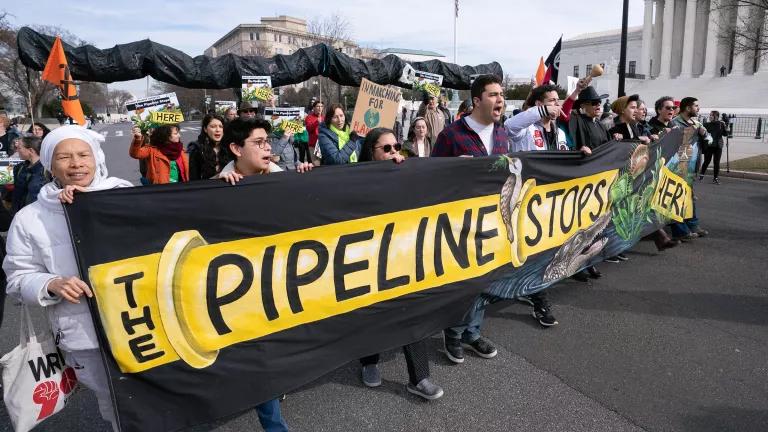Biden Can Protect Communities, Halt Mountain Valley Pipeline
We have new leadership in Washington under President Biden, and his administration should take action to send the Mountain Valley Pipeline right where it belongs—into the dustbin of history.

Polluted stream at the bottom of a steep pipeline slope
We have new leadership in Washington under President Biden, and his administration should take action to send the Mountain Valley Pipeline right where it belongs—into the dustbin of history.
I recently blogged about 5 key reasons to stop the Mountain Valley Pipeline (MVP), which would transport dirty fracked gas across Appalachia. Unfortunately, despite the science, the imperative to stop global warming, and legal obligations to protect clean water, national forest land, and endangered species habitat, the prior administration—no friend of the environment—kept issuing illegal permits to move this dirty and destructive project forward.
But there is still time to change the outcome. In January, President Biden issued an executive order aimed at tackling the climate crisis, protecting public health and the environment, and restoring science in federal decisions. Executive Order 13990 directs federal agencies to review the former administration’s decisions that conflict with the principles of environmental protection, reducing climate change, and using the best available science. The EO also directs agencies to take action to address these inconsistencies where appropriate.
What does that mean for MVP? It means that the Biden Administration can reverse anti-environmental actions taken under Trump that greased the skids for the fracked gas MVP. The new administration has already rescinded approval for copper mining at an Apache sacred site in Arizona and cattle grazing on public lands permitted in Oregon without full public input.
MVP decisions that Biden should reverse:
- The December 2020 U.S. Forest Service Final Supplemental Environmental Impact Statement and Record of Decision to amend the Jefferson National Forest Land and Resource Management Plan;
- The January 2021 Bureau of Land Management right-of-way and temporary use permit; and,
- The September 2020 U.S. Fish and Wildlife Service Biological Opinion and Incidental Take Statement.
MVP has already harmed landscapes and clean water: West Virginia and Virginia have assessed MVP more than $2 million in penalties for more than 350 environmental violations. And there is more high-risk construction planned: MVP still has to cross hundreds of water bodies along the pipeline route. The Biden Administration can stop future risks to water quality by ensuring that the Assistant Secretary of the Army for Civil Works review the pipeline’s new application for a Clean Water Act permit with stringent consideration of whether it can comply with water quality standards.
Pipeline construction is typically broken into chunks called “spreads.” Not one of MVP’s nine spreads is 100% complete; the entire route is only 51% complete. In total, MVP’s route includes more than 225 miles of high landslide risk—more miles than any other approved gas pipeline, comprising more than 74% of the route. The remaining sections to be constructed include some of the steepest slopes, at highest risk for landslides and threats to clean water. And all this construction damages private property along the way—when there is no public benefit.
This potentially irreparable devastation of land and water should never have been allowed. The pipeline is completely unnecessary. There has never been any genuine documented need for this pipeline. Lack of need was a key reason why former FERC commissioner Cheryl LaFleur voted to reject MVP in 2017. This pipeline is a remnant of a dirty and destructive fossil fuel history. It’s billions over budget, years over schedule, in search of a market and has no place in our clean energy future.
If completed and operated, MVP would add estimated full life cycle greenhouse gas emissions (excluding construction emissions) of almost 90 million metric tons per year to our atmosphere. Think about it: MVP would yield the equivalent of emissions from 23 average U.S. coal plants or over 19 million passenger vehicles driven every year.
MVP has already harmed clean waters, local communities, and ecological resources. Construction and operation will only lead to more destruction of landscapes and ecosystems, as well as dangerous contributions to climate change.
It’s time to shut down this dangerous pipeline, once and for all.



